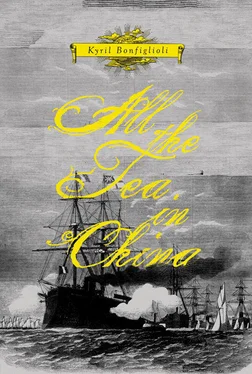“Surely, Mr J., you’re not going?” asked Blanche, distressed.
“Going, going; vy should I be going just ven my happetite is properly tickled? No no, just wants my hat, lid, tile — calls it Golgotha, ‘place of the skull’ you know, haw haw! — it’s my portable scrutoire.”
He fumbled in the lining of the great beaver and after turning out a raffle of bills of exchange, promissory notes and notices of the meetings of fox-dogs, finally found and handed to me a scrap of paper with his great blotted scrawl on it. The words were “P. Stenegave DA PM”.
I shall not pretend that the oyster turned to ashes in my mouth: such extravagances are bred only in the heated minds of female novelists, but I recall that I gulped at the little bivalve with some difficulty, for it was clear that, against all odds, my dear messmate Peter was alive.
So intense was my emotion that I found it difficult to speak until I had emptied my plate and Mr J. was refilling it.
“Yes, please,” was what I said, “and a few of those cocks’-combs and other tid-bits, if you please. Thanks. By the bye, what does ‘DA PM’ mean?” He inserted his fork under his wig and scratched reflectively. “Can’t say as I recalls now,” he said, wiping it on his napkin (the fork, not the wig), “but ‘PM’ must signify ‘post meridgium’ or afternoon, must it not? My vord, ’ow beautifully laced this beef is with delicate yellow fat, thinks I’ll take a touch more. ‘Well bred, well grown, well killed, well ’ung, well bought and well-dressed’ as the old King used to say. Ah yes, ‘DA’ signifies the place where you might find this hacquaintance of yours. Yes, that’s it, ‘Dirty Annie’s’ is the place he named. Any arternoon, or p.m. Vould have said he was a longshoreman, shy of the price of a pot of ale, but for ’is woice.”
I would not have been able to contain myself had Mr J.’s carving not reached, at that very moment, the rich, red centre of the beef. In the event, it was not more than ten or fifteen minutes before I felt constrained to rise to my feet and beg the company’s forgiveness, saying that I had reason to think that an old friend was in grave distress. Blanche gave me a puzzled but loving look; Mrs Jorrocks was too deeply — and noisily — involved in victuals to have heard; John Jorrocks gazed at me curiously, for, when wiping my lips with the napkin, I had also cleared part of my face from perspiration with a gesture which Captain Knatchbull would certainly have recognised. There was a chinking noise under the table — Mr J. had his purse out and was proffering it to me. I smiled and shook my head.
“I should be back within the hour, dearest,” I said to Blanche, “pray keep our guests here until I return.” With that I was off, bounding down the stairs without a thought for my digestion, seizing my hat and hailing the first four-wheeler. The owner of the “growler” had no wish to go to the India Docks but my will was stronger than his.
Outside Dirty Annie’s there was the usual scattering of loiterers, hands deeply pocketed. As I passed a little, old, nut-brown man a dear and familiar voice said “Too proud to recognise your old mess-mate, Karli?” I scanned the line of loafers suspiciously, but no, the voice came from the old man. It was Peter; toothless, hairless, wizened and shabby but undeniably Peter.
His smile was not the same, because of the lack of the teeth, but it was as warm as ever, and as wry.
“You, too, have changed, Karli, but losing your puppy-fat suits you.”
We fell into each other’s arms and I fancy we danced a little jig of delight. No one spared us a glance, for such sights are a commonplace in every great port. Then I said, lying tactfully, that I was starving and that he must come and eat with me, for dinner was on the table.
“Not in these clothes. I mustn’t shame you before your fine friends. And, just at present, I have no others. And to tell the truth I would much prefer a drink, it keeps a fellow warm, d’you see.” It was a warm day, but I did not point that out. I hurried him away to the nearest decent tavern — that is to say, I tried to hurry him but his gait was uncertain and plunging as though the cobbles of the street were covered deep with feather mattresses. With sinking heart I recognised this gait: it is a sign of locomotor ataxia , a disease which visits those who are in the last stages of syphilis.
The nearest tavern to the Docks was empty and dirty; the fat, blubber-lipped landlord who stood at the door had a shifty look. But I did not think that Peter could walk much further; it would have to do.
I ordered a bottle of brandy, lemons, hot water and sugar, such as I knew he loved; also a cold fowl in its broth.
He retched and gagged over his first glass, then his face gained a little colour — although not a colour I would like to see on my own face — and his hand was steadier when he filled the next. Little by little, between potations, I coaxed a disjointed story from him. He was in the mood to drink toasts to the most improbable people and occasions: he made me drink to long life for the odious Captain Dogg who, pistol in hand, never sleeping, had navigated the open boat like an insane genius, doling out water and biscuit in sips and bites over the countless sea-miles before they made a miraculous landfall on the south east coast of Ceylon.
We drank to the Booby-bird which Peter had caught one dawn in his bare hands and which they had torn apart and gobbled, raw and bleeding, two mouthfuls to a man.
We drank to the marvellous fact that large fishes, when you can catch and boat them, have eyes full of sweet, fresh water.
We stood and drank bumpers, solemnly, to the man who had drunk seawater at midnight and died at noon, and to the old coxswain who had seen his mother walking on the burning water and had stepped over the side to meet her.
We drank to Peter’s teeth which, he said, had been rattling loose as castanets by the end of the voyage and which he had given, one by one, to the kindly Sinhalese natives who had guided them (at the point of Captain Dogg’s pistol) across the swamps and quagmires to where a Royal Navy frigate had been lying, licking her wounds after a storm-battering.
When I called for the next bottle the landlord thoughtfully coaxed us into the inner “snug” where, he pointed out, we could sing undisturbed by the curious crowd which had gathered about us.
There we toasted the Second Mate, whose hair had turned pure white overnight after a tropic rainstorm. “I swear it’s true, Karli,” Peter giggled, “you could see the hair-dye all over his face and chest!”
It was at about that time that we determined to become a little drunk. “But first,” I said owlishly, “first we must see about you, Peter, for — forgive me — you do not seem to be in good case.”
“Pray do not fret, Karli, it’s of no importance, I assure you. The pox, d’you see, is up to my eyebrows now…” He lifted his cap and sure enough, just below the hairline there was the corona Veneris , the crown of Venus, the circlet of pustules which tells the pox-ridden that there is no hope.
“Cheer up Karli,” he cried merrily — a merriness made hideous by his naked gums — “my navigation is still adequate; I’ll get a berth in some foreign-going bucket and that’ll see me through the rest of my allowed time.”
I cleared my throat, frantically searching for some way of offering help.
“Your wife …?” I muttered.
“Let’s drink to the bitch. Found her in bed with her lover. I offered to thrash him. He thrashed me.”
“Your father …?”
“Married his nurse on his deathbed. I’m a Marquess now, the poorest and poxiest Marquess in Great Britain. Let’s drink…”
Читать дальше












